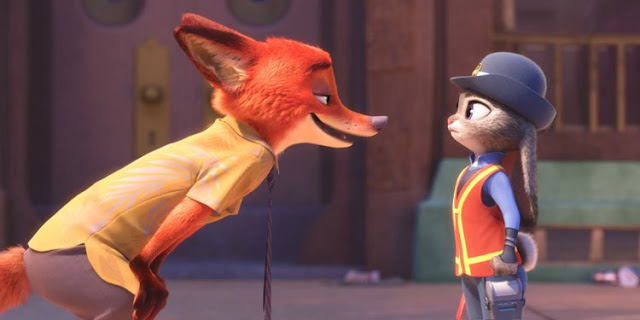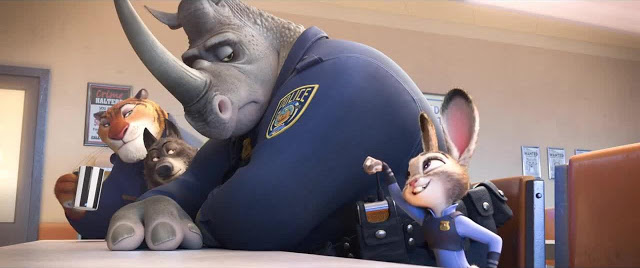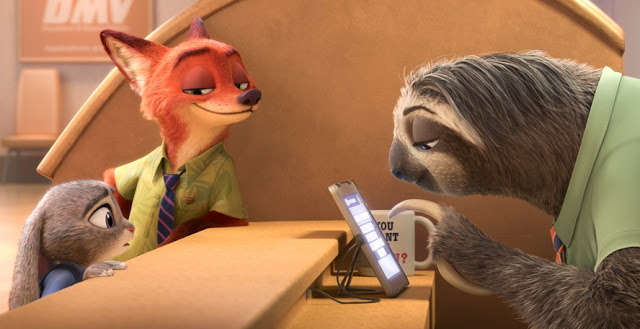The cliché about modern animated movies is that they satisfy both kids and adults. In reality, they tend to satisfy kids or adults, with specific elements aimed exclusively at each demographic; kids are entertained by talking animals and scatological humor, while parents are placated by wry sarcasm and the sporadic literary or cinematic reference. Disney’s Zootopia isn’t entirely immune to this kind of bifurcation—there are broad gags about genitalia (groan), and there are subtle jabs like a group of critters who work at Lemming Brothers Bank (ha!)—but for the most part, it avoids the trap of pandering to its audience. This doesn’t mean it has nothing to say; on the contrary, Zootopia targets its younger viewers with a message that is familiar but also well-meaning and even resonant. It’s a kids’ movie made by adults.
The surprising power of that message is initially obscured by the film’s brisk setup and lively visuals. As the punny title suggests—this is presumably the first animated movie that will inspire parents to teach their children about the writings of Thomas More—Zootopia takes place in a universe populated by anthropomorphic animals who live in apparent harmony. Our heroine is Judy Hops (Ginnifer Goodwin), a perky bunny rabbit with big ears and a bigger heart who aspires to become the metropolis’s first cotton-tailed police officer. Judy may be small in stature, but her will is indomitable, and what she lacks in size she compensates for with quickness and guile. That’s an awfully familiar trope, and Judy’s quest for self-fulfillment results in the predictable recitation of trite platitudes found so often in children’s literature. Be yourself! Never give up! Follow your dreams!
Get lost, right? Not so fast. Even for curmudgeons of a certain age, Zootopia quickly proves fleet and appealing, and not just for its eye-popping animation. It also reveals itself to be narratively ambitious—in addition to serving as a coming-of-age/fish-out-of-water story, it’s an involving caper. First given the humiliating assignment of parking duty, Judy learns about the ongoing investigation of a lost otter, and she resolves to crack the case. In the process, she runs into Nick Wilde (Jason Bateman), a sly fox with a sharp tongue and a slick hustle. Nick is everything Judy isn’t: experienced, selfish, and woefully cynical. He is, in other words, her perfect partner, and Judy—thanks to her quick wit and her knowledge of tax law—soon enlists his help in recovering the missing mammal.
Their journey produces some surprises, though the conspiratorial plot is only part of the point. This is still an animated adventure, after all, and one of its primary functions is to dazzle with technological prowess. As an entertainment dispensary, Zootopia is sleek and serviceable, smoothly assembling some of the various achievements found in other recent Disney successes. Directors Byron Howard and Rich Moore helmed Tangled and Wreck-It Ralph, respectively, and while Zootopia lacks the former’s verbal dexterity and the latter’s imaginative brilliance, it still sports the same touches of loving craftsmanship, from the evident fluffiness of Judy’s ears to the pale lavender of her irises. All of the characters’ faces are remarkably expressive, from Judy’s buffalo of a boss (Idris Elba) to the doughnut-craving cheetah who mans the front desk (Nate Torrence) to a celebrity gazelle who is voiced by, of all people, Shakira. In addition, the myriad environments look terrific (co-director Jared Bush worked on Big Hero 6, with its inimitable San Fransokyo), especially when the lights go down and the weather acts up; a scene where Judy and Nick fight through lashing raindrops in a jungle has a palpable chill.
That sequence is one of the movie’s more kinetic moments, but while Zootopia is busy, it is not overly reliant on loud and noisy action sequences. It prefers to explore the humor of its premise, with mixed results. Some of its innovation is genuinely inspired; there is a hilarious gag involving a DMV operated by sloths, and much of the dialogue is smart and sharp. (A play on the idiom “the elephant in the room” may be predictable, but it’s no less funny.) But an extended sequence at a nudist club feels especially childish (call it the crass menagerie), while an homage to The Godfather featuring a menacing arctic shrew is, to say the least, unworthy of its source. Still, while Zootopia‘s artistic merits are more impressive than sensational, it’s a largely pleasurable experience, suggesting a well-packaged product of cheery, kid-friendly entertainment.
Except it’s actually more than that. This movie has something else in mind, something beyond providing 100 minutes of quality babysitting. The metropolis of Zootopia prides itself as a place where predators and prey coexist in peace, but as Judy and Nick continue their investigation, they discover that a number of the city’s native carnivores are mysteriously exhibiting primitive, violent behavior. As word gets out, panic spreads, prejudice surges, and—in the film’s nerviest move—Judy theorizes that the predators may be reverting to their natural, biological tendencies. It’s a hypothesis that revolts Nick but that quickly finds purchase in the community at large, fragmenting a previously harmonious society with discord and suspicion.
Now that is scary, and scarily plausible. You will forgive me if I equate contemporary politics with a movie that features talking rhinoceroses, but anyone who pays even cursory attention to the upcoming presidential election will recognize the ideological similarities between Judy’s misguided postulating and some of the vulgar speechifying being espoused at the debate hall. The worthy lessons of Zootopia are that bigotry is contagious, that mistrust can curdle into hatred, and that tolerance of others—be it other species or other ideas—is essential to the fabric of society.
That sounds a tad preachy, but Zootopia is too skillful in expressing its themes to be clumsily didactic. Some of the storytelling is purely visual; a scene on a subway where a mother worriedly draws her offspring closer as a nominal predator takes his seat near them is a beautiful crystallization of the movie’s heartfelt concern with empathy, and its disgust toward hostility. Besides, there is something disarming about the film’s directness, its willingness to engage children on important, depressingly relevant issues like racism and fearmongering. It entertains kids, but it also educates them.
A utopia is a theoretical paradise, a land of majestic perfection. Zootopia is hardly a perfect movie—it is enjoyable, not extraordinary—and Zootopia itself has plenty of problems. But it also has Judy and Nick working together to combat prejudice and restore justice through teamwork and honesty. That’s worth championing. So maybe I’m wrong. Maybe this flawed, vibrant menagerie is a paradise after all.
Jeremy Beck is the editor-in-chief of MovieManifesto. He watches more movies and television than he probably should.



